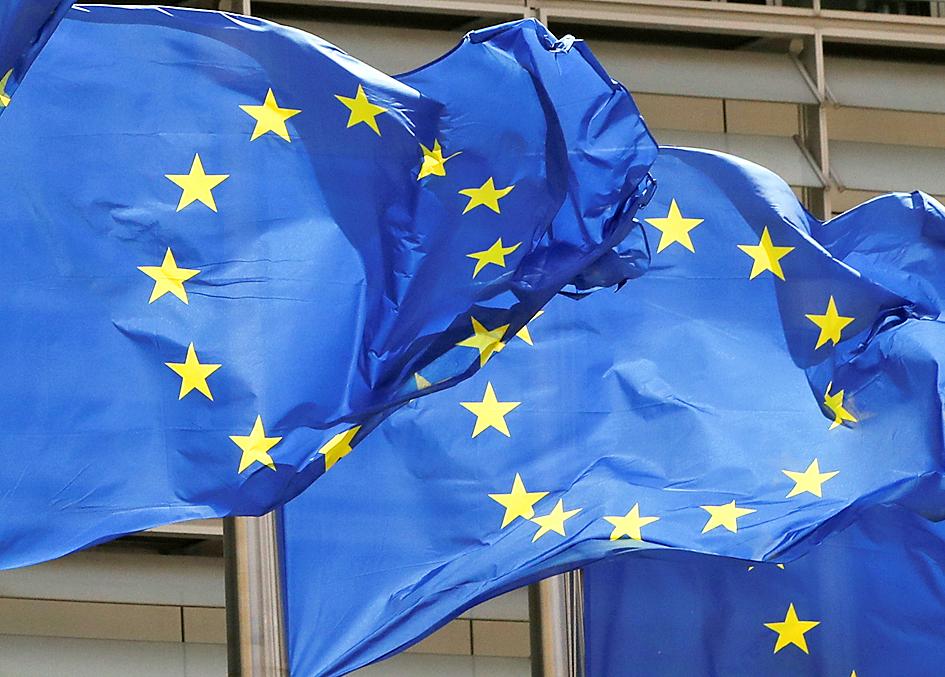Taiwan, Japan, the US, the UK, Australia and Canada have asked to join talks about the EU’s complaint to the WTO over China’s economic sanctions against Lithuania, said the global trade agency on Friday.
The EU first brought the case to the WTO on Jan. 27, saying it had a wealth of evidence that China had been economically pressuring Lithuania for allowing a Taiwanese representative office to be established in Vilnius.
Chinese actions against Lithuania include “a refusal to clear Lithuanian goods through customs, rejection of import applications from Lithuania and pressuring EU companies operating out of other EU Member States to remove Lithuanian inputs from their supply chains when exporting to China,” the EU said in a statement.

Photo: Reuters
Taiwan and Australia aside, the states are G7 members, with EU members France, Germany and Italy making up the remainder.
“This case is important for most WTO members. The world’s most powerful economies, including all members of the G7, have joined forces against China’s illegal actions that threaten the entire international trading system,” Lithuanian Minister of Foreign Affairs Gabrielius Landsbergis said.
The refusal of customs clearance for goods not only threatens the EU’s domestic and foreign supply chains, but also affects Taiwan’s foreign trade, a source cited the letter as saying.
The WTO said that according to regulations, the first stage of talks must be between the two parties directly involved in the conflict — in this case the EU and China.
If no consensus is reached within 60 days, the talks would enter the second stage, at which time the EU could form a dispute-resolution panel with third parties, it said.
In a statement to the WTO on Friday, the EU said that China’s actions toward Lithuania constitute “discriminatory trade,” and that such actions have already affected the entire EU supply chain.
However, the EU has also said that despite evidence China contravened WTO rules, it would continue to seek a diplomatic solution, because China is an “important partner” of the EU.
Additional reporting by AP

A Ministry of Foreign Affairs official yesterday said that a delegation that visited China for an APEC meeting did not receive any kind of treatment that downgraded Taiwan’s sovereignty. Department of International Organizations Director-General Jonathan Sun (孫儉元) said that he and a group of ministry officials visited Shenzhen, China, to attend the APEC Informal Senior Officials’ Meeting last month. The trip went “smoothly and safely” for all Taiwanese delegates, as the Chinese side arranged the trip in accordance with long-standing practices, Sun said at the ministry’s weekly briefing. The Taiwanese group did not encounter any political suppression, he said. Sun made the remarks when

The Taiwanese passport ranked 33rd in a global listing of passports by convenience this month, rising three places from last month’s ranking, but matching its position in January last year. The Henley Passport Index, an international ranking of passports by the number of designations its holder can travel to without a visa, showed that the Taiwan passport enables holders to travel to 139 countries and territories without a visa. Singapore’s passport was ranked the most powerful with visa-free access to 192 destinations out of 227, according to the index published on Tuesday by UK-based migration investment consultancy firm Henley and Partners. Japan’s and

BROAD AGREEMENT: The two are nearing a trade deal to reduce Taiwan’s tariff to 15% and a commitment for TSMC to build five more fabs, a ‘New York Times’ report said Taiwan and the US have reached a broad consensus on a trade deal, the Executive Yuan’s Office of Trade Negotiations said yesterday, after a report said that Washington is set to reduce Taiwan’s tariff rate to 15 percent. The New York Times on Monday reported that the two nations are nearing a trade deal to reduce Taiwan’s tariff rate to 15 percent and commit Taiwan Semiconductor Manufacturing Co (TSMC, 台積電) to building at least five more facilities in the US. “The agreement, which has been under negotiation for months, is being legally scrubbed and could be announced this month,” the paper said,

NATIONAL SECURITY THREAT: An official said that Guan Guan’s comments had gone beyond the threshold of free speech, as she advocated for the destruction of the ROC China-born media influencer Guan Guan’s (關關) residency permit has been revoked for repeatedly posting pro-China content that threatens national security, the National Immigration Agency said yesterday. Guan Guan has said many controversial things in her videos posted to Douyin (抖音), including “the red flag will soon be painted all over Taiwan” and “Taiwan is an inseparable part of China,” while expressing hope for expedited “reunification.” The agency received multiple reports alleging that Guan Guan had advocated for armed reunification last year. After investigating, the agency last month issued a notice requiring her to appear and account for her actions. Guan Guan appeared as required,